Qattal- Unmet Expectations in Yemen
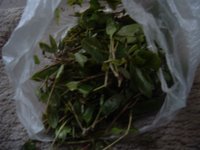 Qattal are the small bits of qat leaves that are much cheaper, and so are not eaten by qat snobs, but they are supposedly still good if you have nothing else available. I thought it a good metaphor for the small bits of travel I have to share.
Qattal are the small bits of qat leaves that are much cheaper, and so are not eaten by qat snobs, but they are supposedly still good if you have nothing else available. I thought it a good metaphor for the small bits of travel I have to share.The day after I last posted, I got to experience long-held dreams, and they didn't meet my expectations. Which is not necessarily a bad thing.
Saltah is kind of like tagine in Morocco- the national dish of Yemen. Having read about it in books like Mackintosh's Travels in Dictionary Land, I had long wanted to try it. It was not at all hot-spicy like I had been told. It was however, with it's mixture of potatoes and stew, very good.
I ran into a poor man while eating, who ended up taking advantage of me monetarily later on, but he helped me buy some qat, which we then went out to eat at a restaurant. We sat there
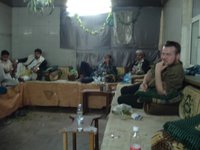 with a bunch of other guys (women chew qat, though not as much, at women's-only gatherings), plugging these leaves into our cheeks. You peel off some, and stuff it in there. Slowly, this bolus grows larger and larger. It's supposed to induce this relaxed state where you enjoy each other's company. Nothing happened. Since then I've tried it again, with the same result. Now both times, I wasn't in the top floor of someone's home, with all the windows closed, listening to poetry and having discussions with friends. Which I think might be a big part of it. I think it's a cultural enjoyment of
with a bunch of other guys (women chew qat, though not as much, at women's-only gatherings), plugging these leaves into our cheeks. You peel off some, and stuff it in there. Slowly, this bolus grows larger and larger. It's supposed to induce this relaxed state where you enjoy each other's company. Nothing happened. Since then I've tried it again, with the same result. Now both times, I wasn't in the top floor of someone's home, with all the windows closed, listening to poetry and having discussions with friends. Which I think might be a big part of it. I think it's a cultural enjoyment of 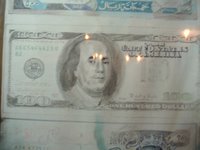 company, much like Englishmen around their tea, more than a drug. Even if the US Government lists it at the same level as cocaine! (However, if you look closely, I did notice that even Ben Franklin chews qat when in Yemen.)
company, much like Englishmen around their tea, more than a drug. Even if the US Government lists it at the same level as cocaine! (However, if you look closely, I did notice that even Ben Franklin chews qat when in Yemen.)As I eat it, I keep on thinking of panda bears. That's what I feel like, eating these leaves. And everywhere you go in this country, you see men (not women, who are all dressed completely in black except for their eyes- unless their the few tourists, or pre-pubescent), from 12 noon on, chewing on these leaves and even stems. At a hotel in Shibam last night I got to try out the red variety- which is a little tastier. Because it's not that tasty. Imagine eating tea leaves. But they're hard. And there's no sugar. That's about the same thing.
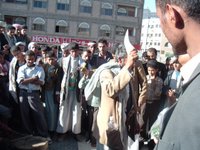
Just as I was beginning to feel lonely and wish for someone to talk to, God had me run into a guy from Michigan studying Arabic in Syria. I met him in the souq, and then later at my hotel. It was relaxing to be able to talk to someone about political and education issues. We saw some men dancing with knives to drums
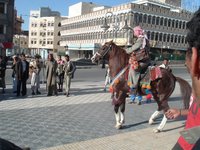 as we were walking. And then the horse got in on the act as well.
as we were walking. And then the horse got in on the act as well.I've been able to see some interesting cultural
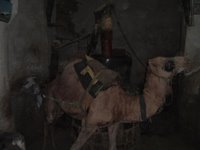 distinctives while wandering through the medina. Camels inside houses, grinding grain. Stores with tons of different kinds of juicy figs. And it's
distinctives while wandering through the medina. Camels inside houses, grinding grain. Stores with tons of different kinds of juicy figs. And it's 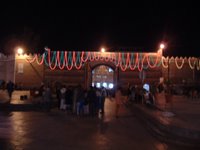 been good to see some Christmas decorations here, such as at the old medina gate in Sana'a :-) More
been good to see some Christmas decorations here, such as at the old medina gate in Sana'a :-) More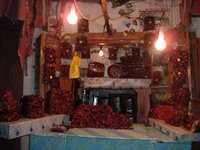 seriously, I was able to find a site mentioned in the above book- there was a great church built by the previous Christian Ethiopian ruler of Yemen, called the great Ekklesia, from the Greek word for church. This ruler was also vying with Mecca to get pilgrim traffic to Yemen, back when Mecca was still a pagan city. In protest, a Meccan merchant defecated in the church. In anger at this, the ruler of Yemen launched a great attack on Mecca, with elephants no less. No one knows quite why it didn't work, but the Qur'an says it was because pigeons dropped a rain of pebbles on the elephants. It is
seriously, I was able to find a site mentioned in the above book- there was a great church built by the previous Christian Ethiopian ruler of Yemen, called the great Ekklesia, from the Greek word for church. This ruler was also vying with Mecca to get pilgrim traffic to Yemen, back when Mecca was still a pagan city. In protest, a Meccan merchant defecated in the church. In anger at this, the ruler of Yemen launched a great attack on Mecca, with elephants no less. No one knows quite why it didn't work, but the Qur'an says it was because pigeons dropped a rain of pebbles on the elephants. It is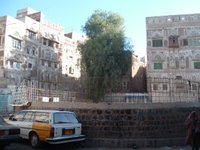 listed as a miracle in the Qur'an, and is the Year of the Elephant, the year Mohammed (pbuh) was born. Had the Yemenis won the day, he might have been born in at least a nominal Christian city. Such are the tides of history. Yet it is interesting how the Qur'an makes it a miracle of God that a pagan city (Mecca) survives the attack of a supposed Christian ruler - after the members of the city did such a thing as desecrating a holy site. Nonetheless, Ekklesia became al Qalis, and al Qalis became pronounced as el Gelis, now the district in Old Sana'a where no one remembers there was once a great church- but rather a flattened square remains, with a great hole in the ground in ruins.
listed as a miracle in the Qur'an, and is the Year of the Elephant, the year Mohammed (pbuh) was born. Had the Yemenis won the day, he might have been born in at least a nominal Christian city. Such are the tides of history. Yet it is interesting how the Qur'an makes it a miracle of God that a pagan city (Mecca) survives the attack of a supposed Christian ruler - after the members of the city did such a thing as desecrating a holy site. Nonetheless, Ekklesia became al Qalis, and al Qalis became pronounced as el Gelis, now the district in Old Sana'a where no one remembers there was once a great church- but rather a flattened square remains, with a great hole in the ground in ruins.True to form, I've been able to pick up an outfit that I've been wearing around. The outfit is what is worn by most men here, and the dagger symbolized being
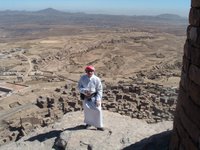 part of a tribe- which most people are here, but increasingly those who aren't have been wearing them to take on the honor of being with a tribe. (That dagger by the way, is real, and very sharp, and is still used in tribal disagreements. When the Kalashnikov, now outlawed in cities unless you have a permit, or the pistol are not being used.)
part of a tribe- which most people are here, but increasingly those who aren't have been wearing them to take on the honor of being with a tribe. (That dagger by the way, is real, and very sharp, and is still used in tribal disagreements. When the Kalashnikov, now outlawed in cities unless you have a permit, or the pistol are not being used.)Interestingly, when people ask me where I'm from in Morocco, I usually say I'm part of a tribe- Qabili- as that seems the easiest way to describe a commune like what I grew up in. But here, tribes are so much more important, I'm getting much different responses. Real interest! They want to know all about my tribe. I translate our group as "People of the Highway" or "Highway Messengers". I had one asking me about what the confederation it was in was (Jesus People). And then I found myself answering his question saying, yes, I guess my dad was the sheik!
People are responding very positively to the garb and my connection with them, being tribal as well- though I say "Qabili jawal- fi Canada, America, u Europe"- a wandering tribe in those three places, to differentiate me from the tribes here. This is truly a land like the Old West, with 3 guns for every Yemeni, and the central government having only weak control over the tribes, who regularly get Western hostages to get concessions from the government. (And then treat the hostages like honored guests.)
I've really enjoyed reading these books that I've linked to as I travel. It makes the traveling
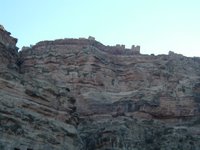 come more alive- even the places I won't be able to visit due to time and money, like Suqutra and the Hadremowt. The last two days I found myself near Sana'a in Shibam and Kowkaban, after finding the travel restrictions for tourists to most places have been lifted of late, as of two months ago. But no one has posted this on the internet yet. Shibam and Kowkaban are traditional villages with tower houses, some perched on cliff tops, in the middle of the desert. One village nearby there
come more alive- even the places I won't be able to visit due to time and money, like Suqutra and the Hadremowt. The last two days I found myself near Sana'a in Shibam and Kowkaban, after finding the travel restrictions for tourists to most places have been lifted of late, as of two months ago. But no one has posted this on the internet yet. Shibam and Kowkaban are traditional villages with tower houses, some perched on cliff tops, in the middle of the desert. One village nearby there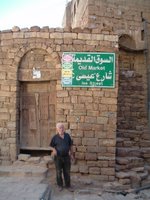 had an interesting street - sharia 'iissa- Jesus Street. Standing in front is a Catholic brother I met and traveled with for a couple days. The one on the left. The one on the right is a bovine brother- their humped here!
had an interesting street - sharia 'iissa- Jesus Street. Standing in front is a Catholic brother I met and traveled with for a couple days. The one on the left. The one on the right is a bovine brother- their humped here!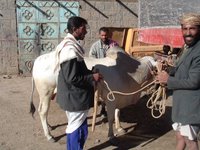
This morning was off to the stone palace of the 2nd to last Imam- religious/political leader- of
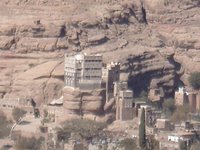 Yemen, John, who had a palace on top of a pillar of rock in the middle of a fertile region a few km outside Sana'a. He was ... eccentric, to be polite. He didn't want his country getting involved with the modern world, and never allowed his picture to be taken. His son, Imam Ahmed, was more ... evil. Both of them seemed to be immune to bullets, until their death, and both talked to evil spirits to gain power. But Ahmed was shot point-blank by three soldiers, who checked to make sure he was dead. And then he got up. He delighted in killing people and putting their heads on the city gates- and this was in the 1960s! On the way to the palace, I ran into an old Avian sister, and we had a long talk.
Yemen, John, who had a palace on top of a pillar of rock in the middle of a fertile region a few km outside Sana'a. He was ... eccentric, to be polite. He didn't want his country getting involved with the modern world, and never allowed his picture to be taken. His son, Imam Ahmed, was more ... evil. Both of them seemed to be immune to bullets, until their death, and both talked to evil spirits to gain power. But Ahmed was shot point-blank by three soldiers, who checked to make sure he was dead. And then he got up. He delighted in killing people and putting their heads on the city gates- and this was in the 1960s! On the way to the palace, I ran into an old Avian sister, and we had a long talk. 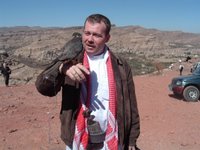
I'll go visit his palace tomorrow for Christmas Eve. I'm here in Ta'izz, the old capitol, to see the language school here, before heading back up, North and East of Sana'a, to see Shibam Hadremowt (Hadramawt), the Manhattan of the Desert, and Ma'rib, the ancient dam built around the time of the Queen of Sheba, or Yemen.
Comments